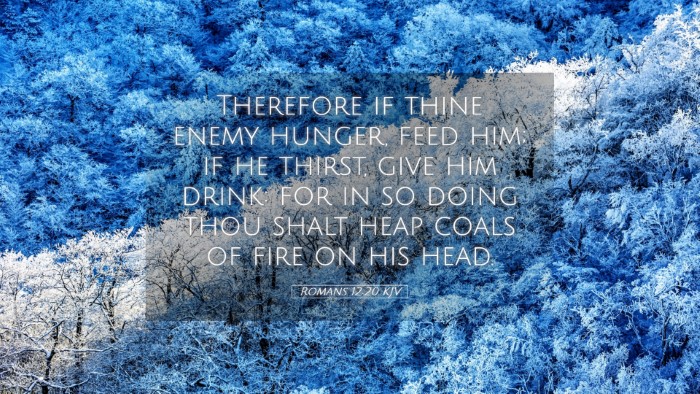Old Testament
Genesis Exodus Leviticus Numbers Deuteronomy Joshua Judges Ruth 1 Samuel 2 Samuel 1 Kings 2 Kings 1 Chronicles 2 Chronicles Ezra Nehemiah Esther Job Psalms Proverbs Ecclesiastes Song of Solomon Isaiah Jeremiah Lamentations Ezekiel Daniel Hosea Joel Amos Obadiah Jonah Micah Nahum Habakkuk Zephaniah Haggai Zechariah MalachiRomans 12:20
Romans 12:20 KJV
Therefore if thine enemy hunger, feed him; if he thirst, give him drink: for in so doing thou shalt heap coals of fire on his head.
Romans 12:20 Bible Commentary
Commentary on Romans 12:20
Romans 12:20 states, "Therefore if your enemy is hungry, feed him; if he is thirsty, give him a drink; for in doing so you will heap coals of fire on his head." This verse encapsulates a profound Christian ethic concerning how to respond to those who oppose or harm us. Below is a synthesis of insights from public domain commentaries.
Contextual Overview
Romans 12 is a pivotal chapter in Paul's epistle to the Romans, shifting from doctrinal teachings to practical instructions for Christian living. In this verse, Paul draws upon the spirit of mercy and grace that Christ exemplified, urging believers to respond to hatred with love, thereby transforming potential conflict into opportunities for witness and reconciliation.
Exegesis of Key Phrases
- "If your enemy is hungry..."
This phrase highlights the radical nature of Christian love; it compels believers to extend kindness even to those who seek to do them harm. Matthew Henry emphasizes that this directive serves to dismantle bitterness and resentment, cultivating a heart that mirrors Christ's compassion.
- "Feed him; if he is thirsty..."
By instructing to provide for one's enemy, the text challenges societal norms where revenge or hostility is often justified. Albert Barnes notes that this act of kindness serves as a profound testimony of God's grace that goes beyond human limitations.
- "Coals of fire on his head."
Adam Clarke interprets this metaphor as a means of potentially provoking guilt in the heart of the offender. Rather than inciting vengeance, the act of kindness may lead them to realize the error of their ways, fostering repentance and reconciliation.
Theological Implications
The theological underpinnings of this verse resonate with the concept of grace. The grace extended by God to humanity, particularly in the person of Jesus Christ, is mirrored in the believer's attitude towards enemies. This passage reveals the challenging call for Christians to emulate their Lord by showing love even in adverse situations.
1. The Example of Christ
Christ, in His earthly ministry, exemplified unparalleled love for His enemies. During His crucifixion, He uttered, "Father, forgive them, for they do not know what they do" (Luke 23:34). This foundational act of grace not only illustrates vulnerability to injustice but also showcases the transformative power of love in breaking down hostility.
2. Overcoming Evil with Good
Paul's admonition aligns with the overarching biblical theme of overcoming evil with good. It reflects a countercultural stance fundamentally opposed to the instinct for retaliation. Both Barnes and Clarke reiterate this notion, asserting that while the world may encourage vengeance, the followers of Christ are called to exemplify a different, higher standard.
Practical Applications
Understanding Romans 12:20 leads to profound practical applications for the Christian life. Pastors, theologians, and students alike can derive several key principles for implementation:
- Active Compassion:
For Christians, this verse encourages proactive compassion. Engaging in acts of kindness, even toward those who might oppose us, serves as an essential expression of faith.
- Redemptive Response:
Instead of retaliating against injustice, believers are called to respond with empathy and love. This redemptive approach can lead to reconciliation and healing.
- Community Impact:
When a Christian community collectively embodies this principle, it can transform societal attitudes towards conflict, promoting a culture of peace and understanding.
Conclusion
In summary, Romans 12:20 presents a challenging yet transformative call for Christians to love their enemies through actionable compassion. Commanded by the Apostle Paul, and illuminated by commentaries from Matthew Henry, Albert Barnes, and Adam Clarke, it remains a critical doctrine for those aiming to reflect Christ's love in a fractured world. By embodying this divine ethic, believers can truly become agents of change, inviting God's healing and grace into even the most challenging situations.


